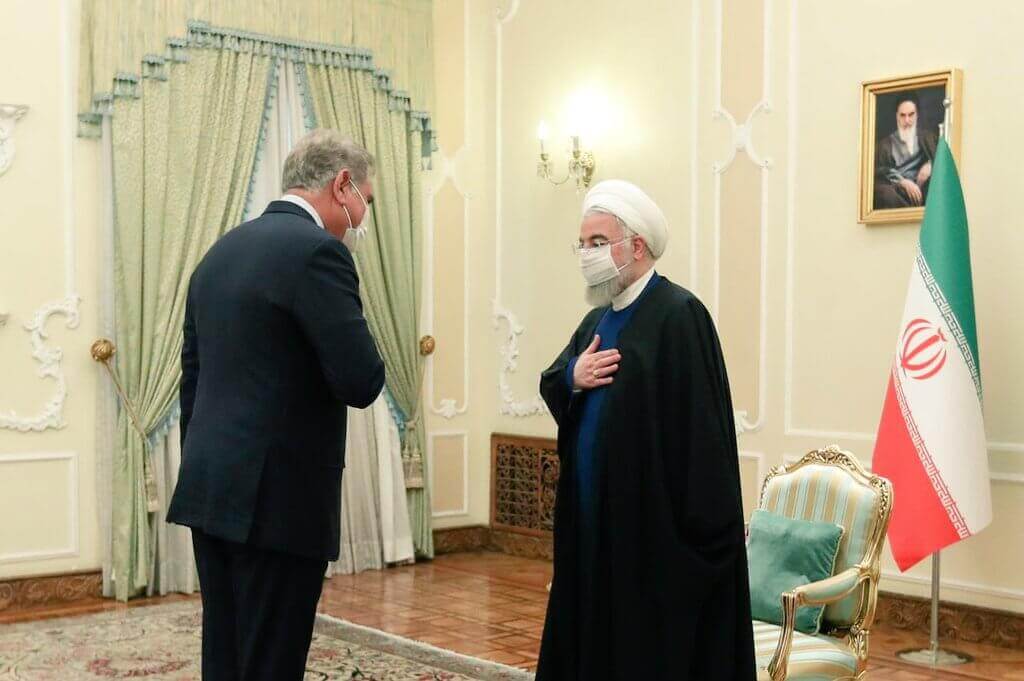On Wednesday, Iranian President Hassan Rouhani and Pakistani Foreign Minister (FM) Shah Mahmood Qureshi called for both countries to guide the Afghan peace process through increased security cooperation following the withdrawal of United States (US) forces from the region. The talks, held in Tehran, focussed on the critical role of Islamabad and Tehran in ensuring the stability of Afghanistan.
In this respect, “Iran and Pakistan, as two most important and effective neighbours of Afghanistan, should increase cooperation and interaction for the development of the peace process in the country,” Rouhani said. For his part, the Pakistani FM emphasised “strengthening and consolidating” the relations between both sides. Rouhani also lambasted the US’ role in Afghanistan by saying that its military presence in the region had “not helped” in advancing security and stability in Afghanistan.
The critique of American forces comes amid the US’ decision to withdraw all American troops from Afghanistan by the 20th anniversary of the September 11 attacks. This drawdown of troops is expected to create a security vacuum in the war-torn country and could lead to greater destabilisation, which would also negatively affect the security of Kabul’s neighbours. Iran and Pakistan are poised to strengthen their security ties in order to prevent any instability from spilling over to their borders.
Qureshi also met with his Iranian counterpart Mohammad Javad Zarif to discuss wide-ranging bilateral relations between the two countries, including economic, diplomatic, strategic, and cultural ties. Among the most significant outcomes of the meet was the establishment of a new crossing point on the Iran-Pakistan border in the Sistan-Balochistan province. The Mand-Pishin border crossing is Pakistan’s third interstate crossing with Iran. “Together, Pakistan and Iran are committed to connect people on both sides and to enhance bilateral trade,” Qureshi said as he announced the joint inauguration of the crossing on his Twitter handle. Zarif added that the development “is a sign for the two countries’ strong will for expansion of economic and commercial ties.” Both sides also agreed that the border crossing would result in greater “security and stability” along their borders by “countering the organised crimes and ending the illegal immigration.”
In a separate meeting, Pakistan’s top diplomat also held talks with Iranian Parliament Speaker Mohammad-Baqer Qalibaf. Qalibaf stressed the need for both countries to jointly fight the rising tide of Islamophobia around the world and said that Iran is “opposed to any kind of voice that promotes discord among the Islamic Ummah.” Accordingly, both sides expressed a willingness to expand cooperation on the religious front by enhancing the joint cooperation of Ulemas from both Pakistan and Iran to work on combating “anti-Muslim bigotry.”
Qureshi’s visit to the Islamic Republic comes amid ongoing talks in Vienna between Iran and world powers to revive the 2015 nuclear deal. Against this backdrop, the Pakistani FM declared his country’s support for the nuclear deal as a diplomatic milestone. To this end, Qureshi said, “We are very happy with Iran’s efforts, the JCPOA has survived, and that today, talks to revive this multilateral agreement is happening.”

